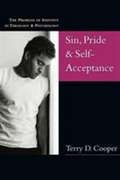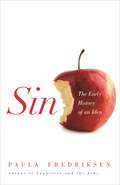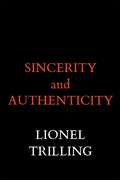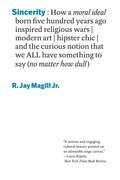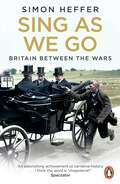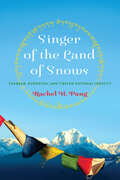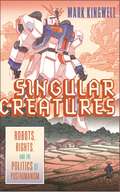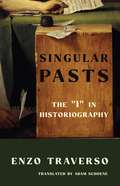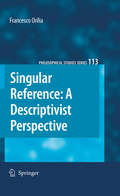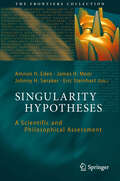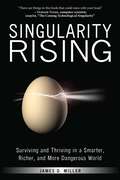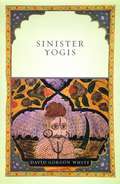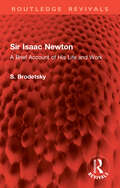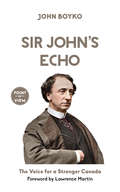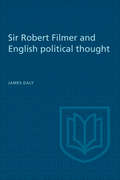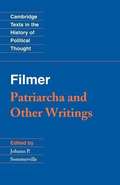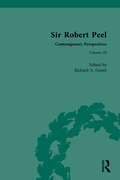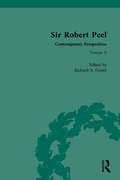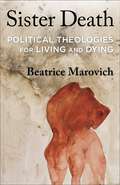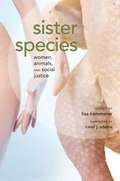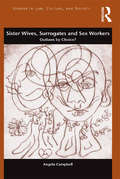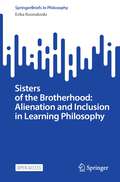- Table View
- List View
Sin, Pride and Self-Acceptance: The Problem of Identity in Theology and Psychology
by Terry D. CooperWhat is at the root of the problem of humanity? Is it pride or lack of self-esteem?Do we love ourselves too much or too little?The debate about the human condition has often been framed this way in both theological and psychological circles. Convictions about preaching, teaching, marriage and child rearing, as well as politics, social welfare, business management and the helping professions, more often than not, fall on one side or the other of this divide. With theological and psychological insight Terry D. Cooper provides trenchant analysis of this centuries-long debate and leads us beyond the usual impasse. Humanistic psychology has often regarded traditional Christianity as its archrival in assessing the human condition. Cooper demonstrates how the Christian doctrine of a sinful and fallen humanity sheds light on the human condition which exhibits both pride and self-denigration. Bringing theological insights ranging from Augustine and John Calvin to Reinhold Niebuhr together with the psychological theories of Freud, Jung, Carl Rogers, Gerald May and Karen Horney, Cooper guides readers through the maze of competing claims to a resolution which affirms Christian conviction while critically engaging modern psychological theory. A model of the proper integration of Christian theology and the discipline of psychology,Sin, Pride & Self-Acceptance will be of special help to students and practitioners of psychology, pastoral counseling and clinical psychology.
Sin: The Early History of an Idea
by Paula FredriksenWhy the meaning of sin changed radically during the first centuries of ChristianityAncient Christians invoked sin to account for an astonishing range of things, from the death of God's son to the politics of the Roman Empire that worshipped him. In this book, award-winning historian of religion Paula Fredriksen tells the surprising story of early Christian concepts of sin, exploring the ways that sin came to shape ideas about God no less than about humanity.Long before Christianity, of course, cultures had articulated the idea that human wrongdoing violated relations with the divine. But Sin tells how, in the fevered atmosphere of the four centuries between Jesus and Augustine, singular new Christian ideas about sin emerged in rapid and vigorous variety, including the momentous shift from the belief that sin is something one does to something that one is born into. As the original defining circumstances of their movement quickly collapsed, early Christians were left to debate the causes, manifestations, and remedies of sin. This is a powerful and original account of the early history of an idea that has centrally shaped Christianity and left a deep impression on the secular world as well.
Sincerity and Authenticity
by Lionel Trilling"Now and then," writes Lionel Triling "it is possible to observe the moral life in process of revising itself. " In this new book he is concerned with such a mutation: the process by which the arduous enterprise of sincerity, of being true to one's self, came to occupy a place of supreme importance in the moral life--and the further shift which finds that place now usurped by the darker and still more strenuous modern ideal of authenticity. Instances range over the whole of Western literature and thought, from Shakespeare to Hegel to Sartre, from Robespierre to R. D. Laing, suggesting the contradictions and ironies to which the ideals of sincerity and authenticity give rise, most especially in contemporary life. Lucid, and brilliantly framed, its view of cultural history will give Sincerity and Authenticity an important place among the works of this distinguished critic.
Sincerity: How a moral ideal born five hundred years ago inspired religious wars, modern art, hipster chic, and the curious notion that we all have something to say (no matter how dull)
by R. Jay Magill Jr."A serious and engaging cultural history painted on an admirably large canvas."--Laura Kipnis, New York Times Book Review What do John Calvin, Sarah Palin, Jean-Jacques Rosseau, and Bon Iver have in common? A preoccupation with sincerity. With deep historical perspective and a brilliant contemporary spin, R. Jay Magill Jr. tells the beguiling tale of sincerity's theological past, its current emotional resonance, and the deep impact it has had on the Western soul. At a time when politicians are scrutinized less for the truth of what they say than for how much they really mean it, Sincerity provides a wide-ranging examination of a moral ideal that remains a strange magnetic north in our secular moral compass.
Sing As We Go: Britain Between the Wars
by Simon Heffer‘An epic new history . . . a work of epic scholarship, breathtaking range, and piercing originality’ Daily Express‘An astonishing achievement of narrative history . . . I think the word is "magisterial".’ Spectator‘Excellent, thorough, detailed and combatively argued.’ Sunday Times______________________________________Sing As We Go is an astonishingly ambitious overview of the political, social and cultural history of the country from 1919 to 1939.It explores and explains the politics of the period, and puts such moments of national turmoil as the General Strike of 1926 and the Abdication Crisis of 1936 under the microscope. It offers pen portraits of the era's most significant figures. It traces the changing face of Britain as cars made their first mass appearance, the suburbs sprawled, and radio and cinema became the means of mass entertainment. And it probes the deep divisions that split the nation: between the haves and have-nots, between warring ideological factions, and between those who promoted accommodation with fascism in Europe and those who bitterly opposed it.__________________________________________'Magisterial . . . an extraordinary achievement.’ Literary Review‘A masterful portrayal of political, social and cultural upheaval between the wars.’ Daily Mail
Singer of the Land of Snows: Shabkar, Buddhism, and Tibetan National Identity (Traditions and Transformations in Tibetan Buddhism)
by Rachel H. PangThe singular role of Shabkar in the development of the idea of Tibet Shabkar (1781–1851), the &“Singer of the Land of Snows,&” was a renowned yogi and poet who, through his autobiography and songs, developed a vision of Tibet as a Buddhist &“imagined community.&” By incorporating vernacular literature, providing a narrative mapping of the Tibetan plateau, reviving and adapting the legend of Tibetans as Avalokiteśvara&’s chosen people, and promoting shared Buddhist values and practices, Shabkar&’s concept of Tibet opened up the discursive space for the articulation of modern forms of Tibetan nationalism. Employing analytical lenses of cultural nationalism and literary studies, Rachel Pang explores the indigenous epistemologies of identity, community, and territory that predate contemporary state-centric definitions of nation and nationalism in Tibet and provides the definitive treatment of this foundational figure.
Singular Creatures: Robots, Rights, and the Politics of Posthumanism
by Mark KingwellAnxiety about non-human intelligent machines is a longstanding theme of cultural production and consumption. Examples range from tales of golems and Frankenstein’s monster to the evil overlord scenarios of contemporary film and television franchises: Star Trek, the Alien series, and the Terminator sequence, as well as Her, Black Mirror, Blade Runner, Ex Machina, and many other less mainstream cultural artifacts. The source of this anxiety is clear. Non-human conscious entities may turn out to be superior to any biological form of life, allowing a stride across human ambition in a moment dubbed “the Singularity” by AI insiders. This is the turning point when non-human entities advance and reproduce in a manner that surpasses and subjugates biological forms of intelligent life. Although today’s artificial intelligences fall notably short of this level of sophistication, Mark Kingwell argues that we are already more than human in important ways, and likely to become more so as time goes on. In Singular Creatures Kingwell plumbs the depths of cultural and political meaning in the apparent transition to posthuman life. Our immersion in technology, now comprehensive to the point of invisibility, has altered forever what it means to be alive. The politics of posthumanism flow directly from our own situation, at once dependent on technology and afraid of its effects on current and future experiences.More than a century after playwright Karel Čapek coined the word robot – rooted in the Czech robota, meaning “servitude” or “drudgery” – in his 1920 allegory about the alienation of forced labour leading to a violent workers’ revolt, Čapek’s central question continues to haunt us. Can humans and their own creations co-exist in a new cyberflesh world, or is a struggle for superiority inevitable? Singular Creatures is an attempt at sketching the field before any deadly battle is joined.
Singular Pasts: The "I" in Historiography
by Enzo TraversoToday, history is increasingly written in the first person. A growing number of historical works include an autobiographical dimension, as if writing about the past required exploring the inner life of the author. Neither traditional history nor autobiography, this hybrid genre calls the norms of the historical profession into question. In search of new and creative paths, it transgresses a cardinal rule of the discipline: third-person narration, long considered necessary to the objective analysis of the past.Singular Pasts offers a critical account of the emergence of authorial subjectivity in historical writing, scrutinizing both its achievements and its shortcomings. Enzo Traverso considers a group of contemporary historians, including Ivan Jablonka, Sergio Luzzatto, and Mark Mazower, who reveal their emotional ties to their subjects and give their writing a literary flavor. He identifies a parallel trend in literature, in which authors such as W. G. Sebald, Patrick Modiano, Javier Cercas, and Daniel Mendelsohn write their works as investigations based on archival sources. Traverso argues that first-person history mirrors contemporary ways of thinking: such writing is presentist and apolitical, perceiving and representing the past through an individual lens. Probing the limits of subjective historiography, he emphasizes that it is collective action that produces social change: “we” instead of “I.” In an epilogue, Traverso considers the first-person writing of Saidiya Hartman as a counterexample. A wide-ranging and illuminating critique of a key trend in humanistic inquiry, Singular Pasts reconsiders the notion of historical truth in a neoliberal age.
Singular Reference: A Descriptivist Perspective
by Francesco OriliaSingular reference is the relation that a singular term has to a corresponding individual. For example, "Obama" singularly refer to the current US president. Descriptivism holds that all singular terms refer by means of a concept associated to the term. The current trend is against this. This book explains in detail (mainly for newcomers) why anti-descriptivism became dominant in spite of its weaknesses and (for experts) how these weaknesses can be overcome by appropriately reviving descriptivism.
Singularity Hypotheses
by James H Moor Amnon H. Eden Johnny H Soraker Eric SteinhartSingularity Hypotheses: A Scientific and Philosophical Assessment offers authoritative, jargon-free essays and critical commentaries on accelerating technological progress and the notion of technological singularity. It focuses on conjectures about the intelligence explosion, transhumanism, and whole brain emulation. Recent years have seen a plethora of forecasts about the profound, disruptive impact that is likely to result from further progress in these areas. Many commentators however doubt the scientific rigor of these forecasts, rejecting them as speculative and unfounded. We therefore invited prominent computer scientists, physicists, philosophers, biologists, economists and other thinkers to assess the singularity hypotheses. Their contributions go beyond speculation, providing deep insights into the main issues and a balanced picture of the debate.
Singularity Rising: Surviving and Thriving in a Smarter, Richer, and More Dangerous World
by James D. MillerIn Ray Kurzweil's New York Times bestseller The Singularity is Near, the futurist and entrepreneur describes the Singularity, a likely future utterly different than anything we can imagine. The Singularity is triggered by the tremendous growth of human and computing intelligence that is an almost inevitable outcome of Moore's Law. Since the book's publication, the coming of the Singularity is now eagerly anticipated by many of the leading thinkers in Silicon Valley, from PayPal mastermind Peter Thiel to Google co-founder Larry Page. The formation of the Singularity University, and the huge popularity of the Singularity website kurzweilai.com, speak to the importance of this intellectual movement. But what about the average person? How will the Singularity affect our daily lives—our jobs, our families, and our wealth? Singularity Rising: Surviving and Thriving in a Smarter, Richer, and More Dangerous World focuses on the implications of a future society faced with an abundance of human and artificial intelligence. James D. Miller, an economics professor and popular speaker on the Singularity, reveals how natural selection has been increasing human intelligence over the past few thousand years and speculates on how intelligence enhancements will shape civilization over the next forty years. Miller considers several possible scenarios in this coming singularity: A merger of man and machine making society fantastically wealthy and nearly immortal Competition with billions of cheap AIs drive human wages to almost nothing while making investors rich Businesses rethink investment decisions to take into account an expected future period of intense creative destruction Inequality drops worldwide as technologies mitigate the cognitive cost of living in impoverished environments Drugs designed to fight Alzheimer's disease and keep soldiers alert on battlefields have the fortunate side effect of increasing all of their users' IQs, which, in turn, adds a percentage points to worldwide economic growth Singularity Rising offers predictions about the economic implications for a future of widely expanding intelligence and practical career and investment advice on flourishing on the way to the Singularity.
Singularity: Politics and Poetics
by Samuel WeberAn influential thinker on the concept of singularity and its implications on politics, theology, economics, psychoanalysis, and literature For readers versed in critical theory, German and comparative literature, or media studies, a new book by Samuel Weber is essential reading. Singularity is no exception. Bringing together two decades of his essays, it hones in on the surprising implications of the singular and its historical relation to the individual in politics, theology, economics, psychoanalysis, and literature. Although singularity has long been a keyword in literary studies and philosophy, never has it been explored as in this book, which distinguishes singularity as an &“aporetic&” notion from individuality, with which it remains historically closely tied.To speak or write of the singular is problematic, Weber argues, since once it is spoken of it is no longer strictly singular. Walter Benjamin observed that singularity and repetition imply each other. This approach informs the essays in Singularity. Weber notes that what distinguishes the singular from the individual is that it cannot be perceived directly, but rather experienced through feelings that depend on but also exceed cognition. This interdependence of cognition and affect plays itself out in politics, economics, and theology as well as in poetics. Political practice as well as its theory have been dominated by the attempt to domesticate singularity by subordinating it to the notion of individuality. Weber suggests that this political tendency draws support from what he calls &“the monotheological identity paradigm&” deriving from the idea of a unique and exclusive Creator-God. Despite the &“secular&” tendencies usually associated with Western modernity, this paradigm continues today to inform and influence political and economic practices, often displaying self-destructive tendencies. By contrast, Weber reads the literary writings of Hölderlin, Nietzsche, and Kafka as exemplary practices that put singularity into play, not as fiction but as friction, exposing the self-evidence of established conventions to be responses to challenges and problems that they often prefer to obscure or ignore.
Sinister Yogis
by David Gordon WhiteCombing through millennia of South Asia's vast and diverse literature, David discovers that yogis are usually portrayed as wonder-workers or sorcerers who use their dangerous supernatural abilities which can include raising the dead, possession, and levitation to acquire power, money, and sexual gratification.
Sinnliche Subjektivität bei Kant: Eine Studie vor dem Hintergrund der Phänomenologie Husserls
by Jiuxing MaoIn diesem Buch bringt Jiuxing Mao die kantische Philosophie und Husserls Phänomenologie hinsichtlich der Thematik der sinnlichen Subjektivität innerhalb der Erkenntnis- und Selbstbewusstseinstheorie miteinander in Dialog. Dieser Dialog ergibt sich als ein wechselseitiges Inspirieren und Zusammenstimmen. Er kann sowohl für die Untersuchung der kantischen Philosophie als auch für die der Husserlschen Phänomenologie gewinnbringend sein. Ziel dieser Arbeit ist es, die Transzendentalphilosophie Immanuel Kants in Hinsicht auf den Status der sinnlichen Subjektivität aus der Perspektive Husserls neu zu lesen und zu zeigen, dass und wie beide Denker wechselseitig aufeinander verwiesen sind. Der Autor Jiuxing Mao hat an der Freien Universität Berlin im Fachbereich Philosophie und Geisteswissenschaften promoviert.
Sir Isaac Newton: A Brief Account of His Life and Work (Routledge Revivals)
by S. BrodetskyOriginally published in 1927 this book presents the main features of Newton’s life and his chief contributions to scientific knowledge. It gives the non-scientist, as well as the specialist, an insight into the life, personality and achievements of one of England’s greatest scientists and polymaths.
Sir John's Echo: The Voice for a Stronger Canada
by John BoykoThe Hill Times: Best Books of 2017 As Sir John A. Macdonald intended, the federal government must be recognized as the nation’s voice. Power. It is the capacity to inspire while encouraging and enabling change, and it matters. When handled in a positive way, power is the key to the state’s ability to strengthen the nation and improve lives. But state power, John Boyko argues forcefully, works best when concentrated on a federal level, as Sir John A. Macdonald and Canada’s other founders intended. Provincial governments are essential, tending to local matters, administering and helping to fund national programs, and sometimes acting as incubators for ideas that grow to become national programs. But in fighting for scraps of power, premiers have often distracted from and occasionally hindered national progress. It is the federal government, as Boyko explains, that has been the primary force in nation building and emergency response, and is the only entity with the authority to speak for all Canadians. Canada has been at its best, and its strength will continue to grow, if we are true to Macdonald’s vision, with the federal government speaking for us in one voice, a voice that will remain Sir John’s echo.
Sir Robert Filmer and English Political Thought
by James DalySir Robert Filmer (1588-1653) was a defender of 'the Natural Power of Kings against the Unnatural Liberty of the People.' His doctrine of omnicompetent sovereignty had little influence on the thought and political debates of his time, for none of his writings was published until the last few years of his life; but it came under scrutiny later in the century, particularly during the exclusion crisis and in the political writings of John Locke. This book is the first comprehensive analysis of his thought, its context, and its place in English political thought as a whole. Daly examines Filmer's publishing career, his relation to contemporary writers and critics, and the chief sources on which he drew. The book thus provides the background for a study of Filmer's theory of sovereignty, its voluntarist concept of law, its rejection of prescription, fundamental law, and non-monarchical forms of government, and its insistence that monarchy be not only absolute, but arbitrary as well. Analysing Filmer's interpretation of Adam's (and all kings') 'fatherly power,' here described as 'legal patriarchalism,' Daly shows it to be very different from most contemporary thought. In comparing Filmer's thought with that of other royalists and the positions taken by his critics, notably Edward Gee, James Tyrrell, Algernon Sidney, and of course Locke, he shows it to be strikingly original, almost revolutionary, and frequently distorted by those who dealt with it.
Sir Robert Filmer: Patriarcha and Other Writings
by Robert Filmer Johann P. SommervilleThis volume contains the political writings of Sir Robert Filmer (1588-1653), an acute defender of absolute monarchy and perhaps the most important patriarchal political theorist of the seventeenth century. The recent explosion of interest in women's history and the history of the family has greatly enhanced the audience for Filmer's work, and in this new edition Johann Sommerville provides accurate and accessible texts of his principal writings, accompanied by all the standard series features, including a concise introduction, chronology, guide to further reading and notes on Filmer's own text.
Sir Robert Peel: Contemporary Perspectives
by Richard A. GauntSir Robert Peel (1788-1850) was one of the most significant political figures in nineteenth-century Britain. He was also one of the most controversial. In this new, three-volume edition, Dr Richard Gaunt, an authority on Peel’s life and work, brings together a range of contemporary perspectives considering Peel’s life and achievements. From the first observation of Peel’s precocious talent as an Oxford undergraduate to his burgeoning reputation as a cabinet minister, the volumes draw together sources on Peel’s forty-year political career. The edition pays particular attention to the most controversial aspects of his political life – the granting of Catholic Emancipation in 1829, his ‘founding’ of the Conservative Party during the 1830s and the achievements of his landmark government of 1841-6, culminating in the repeal of the corn laws in 1846. It also considers Peel’s post-1846 career, and the unusual position he occupied in British politics before his untimely death in 1850. Combining perspectives from different parts of the political spectrum, the collection will be of use to a wide range of researchers, with interests in history, politics, religion, economics and political biography.
Sir Robert Peel: Contemporary Perspectives
by Richard A. GauntSir Robert Peel (1788-1850) was one of the most significant political figures in nineteenth-century Britain. He was also one of the most controversial. In this new, three-volume edition, Dr Richard Gaunt, an authority on Peel’s life and work, brings together a range of contemporary perspectives considering Peel’s life and achievements. From the first observation of Peel’s precocious talent as an Oxford undergraduate to his burgeoning reputation as a cabinet minister, the volumes draw together sources on Peel’s forty-year political career. The edition pays particular attention to the most controversial aspects of his political life – the granting of Catholic Emancipation in 1829, his ‘founding’ of the Conservative Party during the 1830s and the achievements of his landmark government of 1841-6, culminating in the repeal of the corn laws in 1846. It also considers Peel’s post-1846 career, and the unusual position he occupied in British politics before his untimely death in 1850. Combining perspectives from different parts of the political spectrum, the collection will be of use to a wide range of researchers, with interests in history, politics, religion, economics and political biography.
Sir Robert Peel: Contemporary Perspectives
by Richard A. GauntSir Robert Peel (1788-1850) was one of the most significant political figures in nineteenth-century Britain. He was also one of the most controversial. In this new, three-volume edition, Dr Richard Gaunt, an authority on Peel’s life and work, brings together a range of contemporary perspectives considering Peel’s life and achievements. From the first observation of Peel’s precocious talent as an Oxford undergraduate to his burgeoning reputation as a cabinet minister, the volumes draw together sources on Peel’s forty-year political career. The edition pays particular attention to the most controversial aspects of his political life – the granting of Catholic Emancipation in 1829, his ‘founding’ of the Conservative Party during the 1830s and the achievements of his landmark government of 1841-6, culminating in the repeal of the corn laws in 1846. It also considers Peel’s post-1846 career, and the unusual position he occupied in British politics before his untimely death in 1850. Combining perspectives from different parts of the political spectrum, the collection will be of use to a wide range of researchers, with interests in history, politics, religion, economics and political biography.
Sister Death: Political Theologies for Living and Dying
by Beatrice MarovichLife and death are commonly seen as representing the starkest of binaries: Death is the ultimate adversary of all that lives. Beatrice Marovich argues that such understandings of mortality have been deeply influenced by a strain of Christian political theology that has left its mark on both religious and secular narratives. Adapting the figure of “Sister Death” from Saint Francis of Assisi, she calls for recognizing that life and death are family.Drawing on a wide range of sources—from Toni Morrison to Jacques Derrida, psychoanalysis to grassroots “death positive” movements—Marovich critiques a racialized political theology that pits life and death against each other in a state of endless war. In a time of extinctions, it is necessary to disrupt this dominant story in order to apprehend death as a collective, multispecies event. Sister Death proposes an alternative view in which life and death are not mortal enemies destined for mutual destruction. Instead, they are engaged in a contested, tense, and sometimes mutually empowering form of connection—a sisterhood.Eloquent and approachable, this book deftly integrates the insights of a number of disciplines to provide a profound reconsideration of the relations between life and death. Sister Death also features a series of original works by the artist Krista Dragomer that stage an ongoing conceptual conversation with the text.
Sister Species: Women, Animals and Social Justice
by Carol J. Adams Lisa A. KemmererSister Species: Women, Animals, and Social Justice addresses interconnections between speciesism, sexism, racism, and homophobia, clarifying why social justice activists in the twenty-first century must challenge intersecting forms of oppression. This anthology presents bold and gripping--sometimes horrifying--personal narratives from fourteen activists who have personally explored links of oppression between humans and animals, including such exploitative enterprises as cockfighting, factory farming, vivisection, and the bushmeat trade. Sister Species asks readers to rethink how they view "others," how they affect animals with their daily choices, and how they might bring change for all who are abused. These essays remind readers that women have always been important to social justice and animal advocacy, and they urge each of us to recognize the links that continue to bind all oppressed individuals. The astonishing honesty of these contributors demonstrates with painful clarity why every woman should be an animal activist and why every animal activist should be a feminist. Contributors are Carol J. Adams, Tara Sophia Bahna-James, Karen Davis, Elizabeth Jane Farians, Hope Ferdowsian, Linda Fisher, Twyla François, Christine Garcia, A. Breeze Harper, Sangamithra Iyer, Pattrice Jones, Lisa Kemmerer, Allison Lance, Ingrid Newkirk, Lauren Ornelas, and Miyun Park.
Sister Wives, Surrogates and Sex Workers: Outlaws by Choice? (Gender in Law, Culture, and Society)
by Angela CampbellDid she choose that?’ Or, more normatively, ’Why would she choose that?’ This book critiques and offers an alternative to these questions, which have traditionally framed law and policy discussions circulating around controversial genderized practices. It examines the simplicity and incompleteness of choice-based rhetoric and of presumptions that women’s conduct is shaped, in an absolute way, either by choice or by coercion. This book develops an analytical framework that aims to discern the meaning and value that women may ascribe to morally ambiguous practices. An analysis of law’s approach to polygamy, surrogacy and sex work, particularly in Canada, the United Kingdom and Australia, provides a basis for evaluating the choice-coercion binary and for contemplating alternate modes for assessing, from a law and policy standpoint, the palatability of social practices that appear pernicious to women. Weaving together interdisciplinary research, an innovative analytical framework for assessing choices ostensibly harmful to women, and a critique of the legal rules governing such choices, this book bears relevance for students, scholars, practicing jurists and policymakers seeking a richer understanding of conduct that moves women to the margins of law and society.
Sisters of the Brotherhood: Alienation and Inclusion in Learning Philosophy (SpringerBriefs in Philosophy)
by Erika RuonakoskiThis open access book explores the gendered reality of learning philosophy at the university level, investigating the ways in which women and minority students become alienated from the social practices of a male-dominated field, and examining pedagogical solutions to this problem. It covers the roles and the interactions of the professor and student in the following ways: (1) the historical situation, (2) the affective, social and bodily situation, and (3) the moral situation. This text analyzes women’s passion for philosophy as a quest for truth, as well as their partial alienation from the social practices of philosophy. It demonstrates that recognition, generosity, and care are central ingredients of good learning and teaching experiences. Providing case studies of experimental courses in philosophy, the book discusses a variety of pedagogical approaches that might increase the inclusiveness of a philosophical education: novel and more gender-balanced ways of interpreting the history of philosophy, problem-based learning as a means of emancipating the student from the traditional master–disciple relationship, body awareness practices as a way of challenging the “disembodying” tendencies of philosophy, and a pluralism of methods to address the needs of different kinds of learners. Thanks to these features, the book is particularly useful for philosophy professors at the university level, but it also provides insights for all readers who feel puzzled about the persistent underrepresentation of women in philosophy.
